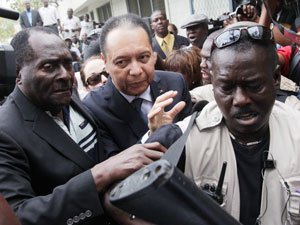Concern, few answers about Duvalier return to Haiti
By Saeed Shabazz -Staff Writer- | Last updated: Feb 2, 2011 - 12:05:53 PMWhat's your opinion on this article?

Haiti's ex-dictator Jean-Claude Duvalier, center, is led by police to court in Port-au-Prince, Haiti, Jan. 18. Photo: AP/Wide World photos
|
But Rep. Maxine Waters (D), who is not one known to mince her words, was quite clear in a Jan. 18 assessment when she stated in a press release: “The plot to control Haiti has gone from the absurd to the ridiculous.”
“Duvalier's return raises serious questions about who in Haiti facilitated his return and what his supporters expect to gain by bringing him back,” stated the California congresswoman.
“I was shocked to learn that OAS (Organization of American States) officials discussed forcing Pres. Preval to leave the country on board a plane,” she said. According to Rep. Waters, a former OAS special representative to Haiti revealed the return was discussed at a meeting which included “United Nations, OAS and donor country officials.”
“The OAS and other international agencies have no right to dictate the outcome of the election and no right to plot the exile of the current president of Haiti,” Rep. Waters said.
At Final Call press time Jan. 24 no one had owned up to bringing Mr. Duvalier to Haiti after 25 years. The UN continued to tell The Final Call the international body with peacekeepers in Haiti had no prior knowledge of Mr. Duvalier's arrival.
In a telephone call from Haiti, Sylvie van den Wildenberg, spokesperson for UN Stabilization Mission in Haiti (MINUSTAH) left The Final Call in a voicemail message saying the UN peacekeeping troops are not protecting Mr. Duvalier. “I can guarantee you,” she said.
An attorney for the former president has been quoted saying that his client returned to make sure that funds he squirreled away in a Swiss bank account would be used for Haiti's post-earthquake reconstruction. Mr. Duvalier, in a printed statement, expressed a desire to participate in the national reconstruction of a country devastated by an earthquake in January 2010 and “show solidarity” with his fellow Haitians.
“Jean-Claude Duvalier in Haiti leaves a bad taste in the mouth of many, many Haitians on the ground there and in the Diaspora,” said Jean Lafortune, president of the Miami-based Haitian American Grassroots Organization.
“Of course we are concerned why he is there, but we also see this as a distraction; we have too many other issues to deal with, this is Preval doing his tricks,” Mr. Lafortune added.
Pierre Labossiere, head of the California-based Haiti Action Committee told The Final Call that the former president “caused a lot of harm to the country.”
Haiti's decline is due in large part to the policies of both the son and the father, Francois Duvalier, Mr. Labossiere said. “Seeing him return to Haiti more of a slap in the face of the people,” he stressed.
The New York-based Haiti Support Project called for the arrest of Mr. Duvalier, while condemning the Haitian government and inaction of the international community. “Duvalier is a criminal who should have been arrested the moment he set foot on Haitian soil. In fact he should never have been permitted to leave France given the multiple crises Haiti is confronting in the wake of the Jan. 12, 2010 earthquake,” said Dr. Ron Daniels, president of the Institute of the Black World 21st Century, and founder of the Haiti Support Project.
Amadi Ajamu, spokesperson for the Brooklyn-based Friday Haiti Relief Coalition agreed with Mr. Lafortune, saying: “The return of Jean-Claude Duvalier to Haiti is a calculated distraction one year after the massive quake and billions of dollars in international donations, and Haiti recovery is moving at a snail's pace.”
Ms. Ajamu said the primary focus must be on the UN's Special Envoy to Haiti, Bill Clinton and organizations such as the Red Cross who continue to control the purse donation strings while the people of Haiti are in need of shelter, clean water, food, health care and schools.
The 15-member UN Security Council, during an open meeting on Jan. 20, concluded that the world body must work with all parties in Haiti to help steer the electoral process towards a credible outcome, amid widespread accusations of fraud, so that it did not distract from earthquake-recovery efforts.
Most of the ambassadors urged donors to fulfill their pledges to Haiti in a timely manner, some emphasizing the need to sustain assistance for the long term, while others underlined the importance of national ownership in the recovery and better coordination of the aid effort.
India's representative, Hardeep Singh Puri, cautioned against MINUSTAH becoming involved in the political crisis, which was better addressed by “relevant” regional organizations. Dr. Susan Rice, the ambassador to the UN, was the only one to mention Mr. Duvalier. She said she “was concerned” given his “human rights record.” However, Ambassador Rice added that “the government seemed to be taking steps to deal with the situation.”
INSIDE STORIES AND REVIEWS
-
-
About Harriett ... and the Negro Hollywood Road Show
By Rabiah Muhammad, Guest Columnist » Full Story -
Skepticism greets Jay-Z, NFL talk of inspiring change
By Bryan 18X Crawford and Richard B. Muhammad The Final Call Newspaper @TheFinalCall » Full Story -
The painful problem of Black girls and suicide
By Charlene Muhammad -National Correspondent- » Full Story -
Exploitation of Innocence - Report: Perceptions, policies hurting Black girls
By Charlene Muhammad -National Correspondent- » Full Story -
Big Ballin: Big ideas fuel a father’s Big Baller Brand and brash business sense
By Bryan Crawford -Contributing Writer- » Full Story






 Click Here Stay Connected!
Click Here Stay Connected!








